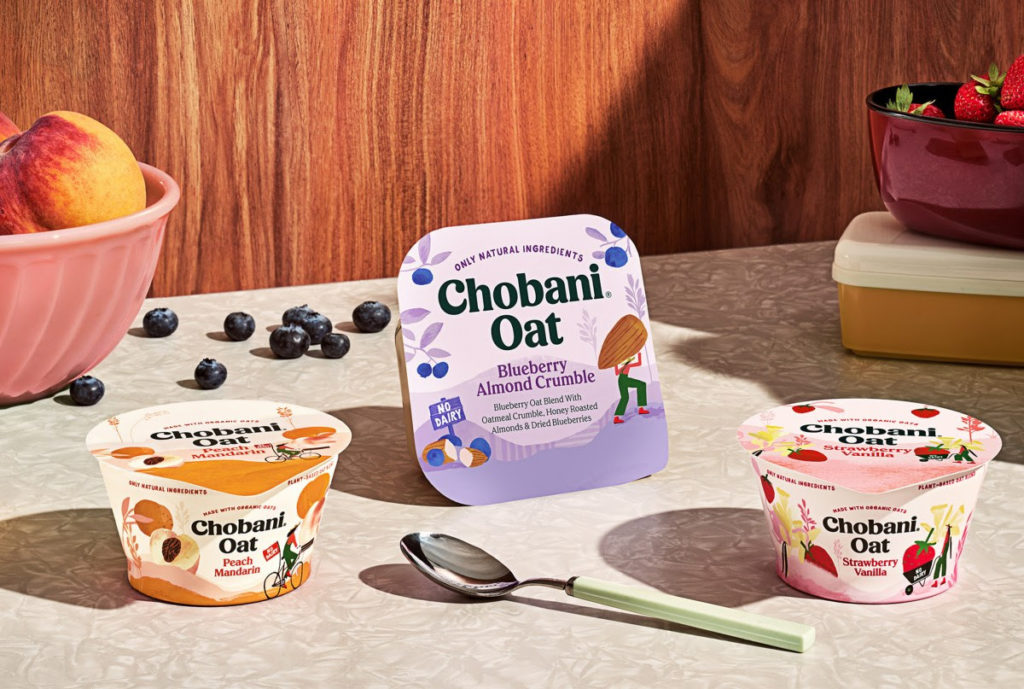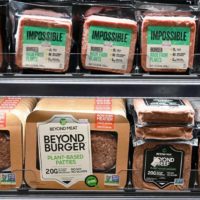
Source: Chobani
Every week we track the business, tech and investment trends in CPG, retail, restaurants, agriculture, cooking and health, so you don’t have to. Here are some of this week’s top headlines.
Foodtech companies raised $4 billion in the last quarter of 2020, much of which was spurred by the continued investment in the food tech space as consumers adopted new behaviors around grocery shopping, restaurant takeout and home delivery.
In CPG news, Chobani and Oatly are eyeing an IPO that could value each of the companies at a whopping $10 billion. Aleph farms has debut the world’s first cell-cultured ribeye steak. Post Holdings has launched a SPAC to raise up to $400 million.
We need your support. Producing our newsletter takes a lot of time and resources, and we need to change our business model to keep it going. To date, we’ve funded our work through our events, sponsorships and consulting, which are all on hold due to the pandemic. If you find our newsletter to be a valuable resource, we hope you will consider making a one time or monthly contribution, so we can keep the newsletter going and free for those who can not afford a subscription fee. Whether it’s $5 or $500 every bit helps and shows us that you value our work. Not able to contribute right now? You can help by sharing our newsletter with friends and colleagues.
Check out our weekly round-up of last week’s top food startup, tech and innovation news below or peruse the full newsletter here.
1. Chobani Eyes 2021 Initial Public Offering – Wall Street Journal
The Greek yogurt maker hopes an IPO could value the company at as much as $7b to $10b.
2. Oatly Weighing $10B Value in US IPO – Bloomberg
The IPO could come as soon as May with only a US share sale for now.
3. Food Tech Companies Raised $4B in Q4 2020 – The Spoon
Cultured meat companies raised more than $383m, and funding for cultivated ag companies hit a record $1.6b in 2020. Retailers have responded to the surge in grocery with investments that will spur further e-commerce adoption.
4. Israel: Aleph Farms & Technion Debut World’s First Cell-Based Ribeye Steak Prototype – Green Queen
The prototype uses 3D bioprinting tech and is grown directly from the cells of cows.
5. Post Holdings Launches SPAC to Raise Up to $400M – Food Dive
The CPG maker is expected to stay close to the food and beverage space it knows well as it looks for companies that will benefit from the experience of its management team.
6. DoorDash Adds Startup Chowbotics for Meal Preparation – Wall Street Journal
Financial terms were undisclosed. DoorDash is exploring how automation could help restaurants expand menu and market.
7. Pairwise Raises $90M to Develop New Fruit and Vegetable Varieities Using CRISPR – Food Dive
Pontifax Global Food and Agriculture Technology Fund led the round. Funding will be used to develop and bring to market more produce with improved taste, enhanced convenience, increased shelf life and more.
8. Danny Meyers Starts a SPAC – Restaurant Business
The $250m blank-check company is looking to acquire businesses across a wide range of industries similar to the people culture that USHG has nurtured.
9. Rodale Enlists Cargill in Unlikely Alliance to Increase Organic Farmland – Civil Eats
Together with poultry company Bell & Evans, the duo is launching the US Organic Grain Initiative, designed to transition 50k acres of corn and soy to organic and help fill a growing gap in domestic organic animal feed.
10. Where Does Grocery Go Next with Online Fulfillment?
Arthur Chow, VP at S2G Venture’s, explains why Amazon’s early foundation may provide a clue as to why brick-and-mortar will still be needed to build a resilient grocery supply chain.
11. 5 Actions to Reboot Food Retail
We have a responsibility to all stakeholders in our supply chains to pursue deep and substantive change, starting with the social and economic issues that underlie how we grow, make, distribute and sell food. Errol Schweizer, host of The Checkout Radio and former VP of grocery for Whole Foods Market, shares 5 actions food retailers, brands and supply chain stakeholders must take to create a more fair, just and sane food system.
12. How Thrive Market, Once Upon a Farm, Omsom and Tagger Media Are Reimagining Discovery, Acquisition and Loyalty
The unprecedented events of the last year forced food brands to quickly adapt to their customer’s needs and shopping behaviors, while also navigating a rapidly changing grocery retail landscape. Founders share how they grew their businesses through new approaches to customer discovery, acquisition and loyalty.
13. Food & Ag Anti-Racism Resources + Black Food & Farm Businesses to Support
Check out our list of resources to learn about systemic racism in the food and agriculture industries. We also highlight Black food and farm businesses and organizations to support.
Our newsletter is the absolute easiest way to stay on top of the emerging sector, so sign up for it today and never miss the latest food tech and innovation news and trends, Already signed up? Share the love with your friends and colleagues!





